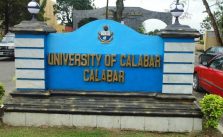Barring a swift return to transparency and fairness, the process for appointing the next Vice Chancellor of the University of Calabar (UNICAL) may soon descend into crisis.
A simmering conflict between the University’s Governing Council and including the outgoing Vice Chancellor, Prof. Florence Obi, threatens to derail the transition.
Credible findings from our sources, indicate a sharp disagreement between the Pro-Chancellor and Chairman of Council, retired DIG Udom Ekpoudom, and the incumbent Vice Chancellor, over the sudden introduction of a new eligibility criterion: a mandatory 10-year post-professorial experience for candidates seeking to become Vice Chancellor.
Other sources within the University reveal that this controversial benchmark was allegedly proposed to eliminate strong contenders perceived as threats to a preferred candidate.
Notably, this criterion has no uniform precedence in UNICAL’s history.
In past appointments, including that of the current Vice Chancellor herself, the requirement ranged between five and nine years of post-professorial experience.
Observers point to this inconsistency as a clear sign that the new 10-year benchmark is arbitrary, discriminatory, and tailored to favor certain individuals while excluding others who are equally or more qualified.
“It is unfair and legally questionable,” a top official from the Federal Ministry of Education disclosed, adding that the Ministry did not issue or support any such directive.
In yet another development breeding discontent, some contenders have made claims about a not so subtle attempt to zone the VCship in an attempt to mimic political arrangements.
A visibly disturbed source who preferred to remain anonymous pointed out that “zoning” is yet another hurdle being placed to eliminate credible and well qualified candidates from the race in a federal university.
These developments have sparked deep concern within the University community.
Several members of the Governing Council, caught unawares by the proposed changes, have distanced themselves from it and reported the matter to the Federal Ministry of Education.
In response, the Pro-Chancellor has reportedly dissociated himself from the Vice Chancellor’s maneuvering and re-assured stakeholders of his commitment to due process and fairness.
The tenure of Prof. Florence Obi ends in November 2025, with the appointment of a new Vice Chancellor expected to take place in September.
However, unless the Council acts decisively to maintain the integrity of the selection process, the university may be plunged into legal battles that could stall the appointment indefinitely.
Across Nigeria’s first-generation universities, the average post-professorial benchmark for VC appointments ranges from six to eight years. UNICAL’s imposition of a 10-year cut-off, without a clear justification or precedent, is therefore not only irregular but susceptible to legal challenge.
Stakeholders are now calling for a return to the status quo—retaining the previous maximum requirement of nine years or below—as the only way to ensure a credible and inclusive process. Anything short of this risks widening the rift between the Council and the University Management, and exposing the institution to avoidable litigation that could paralyze its operations.
The eyes of the academic community are watching. UNICAL must rise above personal interests and uphold the principles of merit, transparency, and fairness in this critical moment.
Stalemate Imminent at UNICAL Over Controversial Selection Process for New Vice Chancellor
